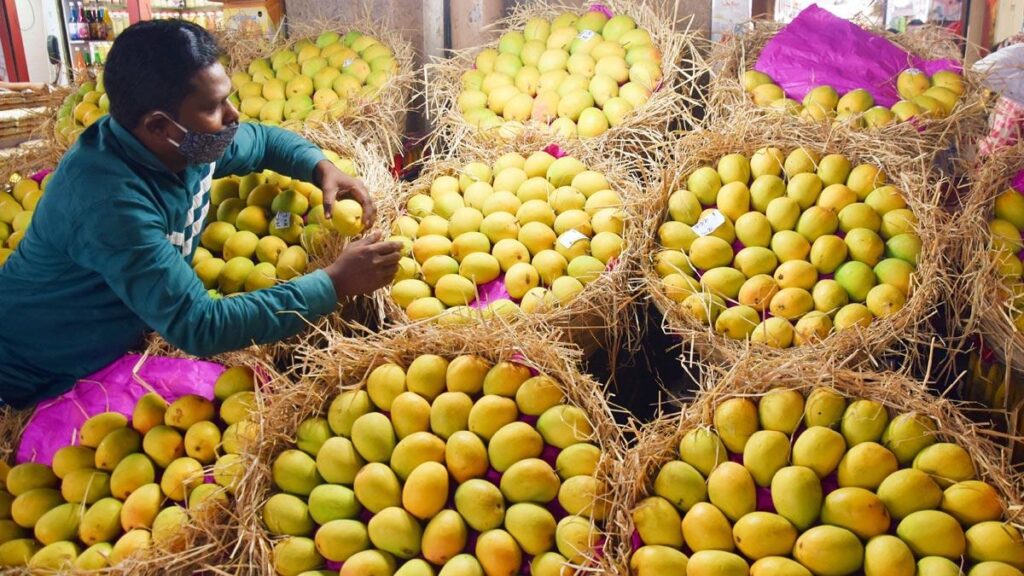Alphonso mango price
Alphonso mangoes, often hailed as the King of Mangoes, are a beloved tropical fruit renowned for their unparalleled sweetness, rich aroma, and creamy texture. Grown primarily in the Konkan region of Maharashtra, India, these mangoes command a premium price in markets both domestically and internationally. But what drives the Alphonso mango price? In this blog post, we’ll explore the factors behind their cost, regional price variations, and tips for getting the best deals on this delectable fruit. Whether you’re a mango enthusiast or a curious shopper, read on to uncover why Alphonso mangoes are worth every penny.

The Unique Appeal of Alphonso Mangoes
The Alphonso mango, also known as Hapus or Hafoos, stands out for its vibrant golden-yellow hue, juicy fiberless pulp, and mouth-watering flavor that blends notes of citrus, honey, and melon. Originating from Portuguese grafting techniques in the 16th century, named after Afonso de Albuquerque, this mango variety is primarily cultivated in Ratnagiri, Devgad, Sindhudurg, and Raigad districts of Maharashtra. Its Geographical Indication (GI) tag certifies its authenticity, ensuring the unique taste and aroma that make it a global sensation.
The short harvesting window, typically from February to June, combined with high demand, significantly impacts the Alphonso mango price in India. Unlike other varieties like Kesar or Banganapalli, which are grown across multiple states, Alphonso’s limited cultivation area creates a supply-demand imbalance, driving up costs.
Factors Influencing Alphonso Mango Prices
Several factors contribute to the premium pricing of Alphonso mangoes:
1. Limited Growing Regions
Alphonso mangoes thrive in the laterite soil and coastal climate of Maharashtra’s Konkan belt. The unique combination of soil, temperature, and coastal breeze in regions like Ratnagiri and Devgad gives these mangoes their distinct flavor. This geographical limitation restricts supply, making Alphonso mango prices higher than other varieties like Kesar or Langda, which are cultivated more widely.
2. Labor-Intensive Cultivation
Growing Alphonso mangoes is no easy feat. Farmers undertake meticulous practices, including:
- Hand pollination to ensure fruit production.
- Delicate pruning for optimal sunlight exposure.
- Manual harvesting to pick fruits at the perfect stage of maturity. These labor-intensive methods, coupled with organic farming techniques used by some growers (e.g., Aamrai Organic), increase production costs, which are reflected in the Hapus mango price.
3. Short Season and High Demand
The Alphonso mango season spans only a few months, from February to June, with peak availability in April and May. Early in the season, prices are higher due to limited supply, often reaching ₹1,500–₹3,500 per dozen for premium quality. As production peaks in April, prices may drop to ₹500–₹800 per dozen, especially in regions like Mumbai and Pune. By late May or June, prices can further decrease to ₹175–₹300 for a half-dozen, as noted in posts on X. High demand, both domestically and for exports, further fuels price spikes.
4. Organic and Carbide-Free Practices
Organic Alphonso mangoes, such as those from Salem mango farmers, are ripened naturally without harmful chemicals like calcium carbide. These carbide-free mangoes require more time and care, increasing costs but ensuring a safer, tastier product. Organic varieties often command a 20% higher price than non-organic ones, with Salem Alphonso priced at around ₹180–₹250 per kg in 2024.
5. Transportation and Export Costs
Alphonso mangoes are delicate and perishable, requiring premium packaging and fast transport, often via air cargo for exports. Strict import regulations in countries like the USA and Europe necessitate additional treatments and certifications, adding to the cost. For instance, export-grade Alphonso mangoes can cost significantly more due to these logistics, impacting the Alphonso mango price online.
Regional Price Variations
- Mumbai and Pune: During peak season (April–June), prices range from ₹500–₹800 per dozen for Ratnagiri and Devgad Hapus. Early season prices can hit ₹1,000–₹2,500 per dozen.
- Kolkata: Due to transportation costs from Maharashtra, prices are higher, often ₹800–₹1,500 per dozen during the season.
- Delhi: Prices fluctuate between ₹350–₹450 per dozen in peak season, dropping from higher early-season rates.
- Salem, Tamil Nadu: Salem Gundu Alphonso, known for its unique taste, costs around ₹600–₹850 per dozen in 2024, with organic varieties at the higher end.
- Export Markets: In the USA, Alphonso mangoes are a premium product, often selling out quickly due to customs restrictions and high transport costs.
Tips for Getting the Best Alphonso Mango Deals
- Buy During Peak Season: Prices are lowest in April and May when supply is high. Monitor local markets or online platforms like AlphonsoMango.in for deals.
- Choose GI-Certified Mangoes: Ensure authenticity by purchasing from reputable vendors like Aamrai Organic or Salemmango, which offer GI-tagged Alphonso mangoes.
- Compare Online and Offline Prices: Online stores often provide real-time price updates and discounts, especially for bulk orders.
- Opt for Local Vendors: Buying directly from farmers in Ratnagiri or Devgad can lower costs compared to supermarkets.
- Beware of Counterfeits: Some vendors sell non-GI mangoes as Alphonso. Look for certification or buy from trusted sources to avoid overpaying for inferior quality.
Why the Price Is Worth It
Despite their cost, Alphonso mangoes offer unmatched quality. Their sweet, juicy pulp and rich aroma make them ideal for desserts, smoothies, lassis, and salads. The cultural significance of Alphonso mangoes, celebrated in events like the Kolkata Mango Festival, adds to their allure. Whether you’re savoring a fresh Hapus or gifting a box to loved ones, the experience is unparalleled.
Conclusion
The Alphonso mango price reflects its exclusivity, from labor-intensive cultivation to limited availability and superior taste. While prices vary across regions and seasons, the joy of biting into a ripe, juicy Alphonso is worth the investment for mango lovers. By understanding the factors behind its cost and shopping smartly, you can enjoy the King of Fruits without breaking the bank. So, this mango season, treat yourself to the authentic taste of GI-tagged Hapus and savor the essence of summer!